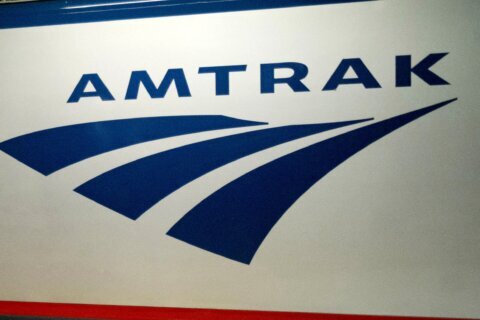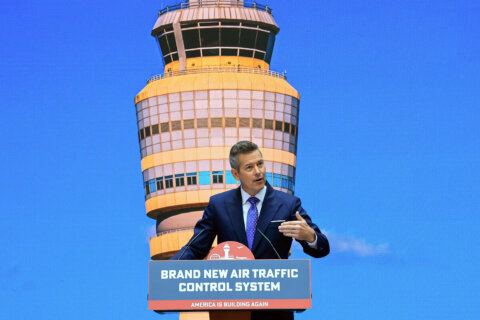WASHINGTON — Plans to fix the chronic slowdowns on the northbound side of Interstate 95 in the Fredericksburg area may never go forward.
Fredericksburg area officials have been trying to get state funding for an additional northbound bridge across the Rappahannock River that would have separated local traffic from through traffic between Va. State Route 3 and U.S. Route 17 in Stafford County.
Each time it has gone through VDOT’s Smart Scale funding formula, it ends up missing out on money.
Fredericksburg city councilman Matt Kelly told WTOP that local officials had asked VDOT to adjust the way it scores projects for funding.
“VDOT has come back to CTB [Commonwealth Transportation Board] and basically said ‘We’re not going to change Smart Scale. We like the way it is, we are going to nibble around the edges and tweak a few things here, but the basic matrix is going to stay the same,'” Kelly said.
The councilman did not agree with that evaluation.
“Everybody agrees that I-95 is a critical transportation area, yet for some reason through the state matrix, they don’t want to fund it or don’t want to recognize the importance of I-95,” Kelly said. “Because if you go back to the last round of Smart Scale, northbound didn’t get funded, but a section of I-95 south of Petersburg got funded.”
He also took issue with other improvements that got money instead of the interstate.
“You look at the first round of Smart Scale,” Kelly stated. “What got funded as statewide significant projects? Trails. Bike trails, walking trails and everything else scored high.”
Kelly said Smart Scale prioritizes projects that have the greatest impact on improving regional transportation.
“Under that dynamic, Northbound I-95 is not going to get funded. That’s the reality we understand,” said Kelly. “So the question we are now talking about is do we pull that project from our regional priority list and refocus our efforts on other projects?”
By focusing on getting state funding to fix I-95, other projects in the Fredericksburg area were placed lower on the regional priority list.
Because of that, many of those also missed out on state funding because they were lower priority plans.
“It definitely has an impact. You have to pick and choose. There’s no new money coming in to fund transportation.”
Kelly said there is only one way an additional I-95 bridge gets funding.
“The only other aspect of this is if we do go down the road of a transportation authority and raise local money, that’s the key factor now with Smart Scale is being able to leverage projects with local money,” the councilman explained.
But that transportation authority doesn’t exist and it’s not clear if it ever will.
“We’re never going to have the money to leverage that project to make it work under the current dynamic of Smart Scale,” continued Kelly.
The fact the region has to put local money into the I-95 efforts in order to make it a higher priority for the state is a factor that bothers Kelly.
“A few years ago, under a prior administration, FAMPO [Fredericksburg Area Metropolitan Planning Organization] — which is in charge of regional transportation planning — was basically told by the then transportation secretary that I-95 is too important to be left to localities and that the state would step in to make determinations on what should be done on I-95, which they did. Other than funding one little piece of it, the rest of it kind of went away.”
To Kelly, I-95 is really a state problem that needs to be fixed, since it’s a state-maintained highway and a critically important thoroughfare for the commonwealth and the entire eastern seaboard.
He said it’s also something that should get more attention from VDOT.
The Fredericksburg elected official said local officials wanted VDOT to adjust is Smart Scale system.
First, they wanted VDOT to reconsider the importance of smaller projects.
“Some of the things we asked for to be changed was take smaller projects and shift them to the district discussion and leave the big money for actual projects of statewide significance. They’re not going to do that.”
Then, they suggested a change to how it evaluated larger projects.
“We asked them to either take interstates away from us or acknowledge that any improvement on the interstate improves the entire system and take that into consideration when evaluating a project,” continued Kelly. “They said no to that.”
They then requested VDOT reconsider the meaning of regional impact.
“Their matrix on commuters is basically a 45 mile distance is what they measure for commuters,” Kelly stated. “Obviously for Fredericksburg, it’s a little more than that to get to D.C. We said you need to re-evaluate what you are going to consider in that dynamic. They said no to that.”
Kelly said they asked VDOT to rethink how local money impacts which projects get state money.
“Hampton Roads and Northern Virginia have their transportation authorities and can leverage projects. And I understand that; don’t want to hold that against them. But to then turn around and tell other localities in the state that you can’t have one, but — oh, by the way — we’re going to grade projects based on how much money you can put toward them. That’s unfair. So, either any locality — if they want to — can establish a transportation authority or you take it off the table as a matrix item when evaluating projects. They don’t want to do that either.”
Kelly stated that if VDOT is unwilling to change how it evaluates funding transportation projects, there is little reason to keep submitting a proposal that is bound to continue being passed over.
“Alright, state and feds: your interstate system, you deal with it and we’re going to focus on regional transportation projects.”







